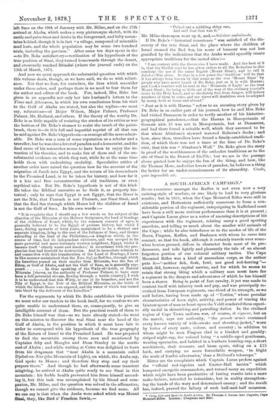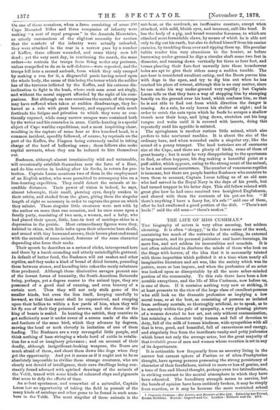A SOUT1I-AFRICAN CAMPAIGN.*
BUSH -FIGHTING amongst the Kaffirs is not even now a very enticing style of warfare, or one likely to lead to very glorious results ; but in 1851, when the Cape Mounted Rifles were still in existence, and Hottentots sufficiently numerous to form a con- siderable portion of the regiment, campaigning in Kaffirland must have been a still more curious performance than it is at present ; and Captain Lucas gives us a series of amusing descriptions of his experiences with the regiment, relating many a good sporting anecdote, and telling us much about the smaller wild animals of the Cape ; while he also introduces us to the modes of life of the Boers, Fingoes, Kaffirs, and Bushmen with whom lie came into contact, so that his book, although it certainly travels over some- what beaten ground, differs in character from most of its pre- decessors, and tells lightly and pleasantly the tale of an almost forgotten portion of our colonial military tactics. The Cape Mounted Rifles was a kind of anomalous corps, as the author puts it—" neither fish, flesh, fowl, nor good red-herring "- which did, however, capital service, and for which he seems to retain that strong liking which a military man must have for a regiment in the dangers and adventures of which he has himself been a sharer. Being in point of fact cavalry, it yet was made to. content itself with infantry rank and pay, and was principally re- cruited from European regiments, one-third of its strength, as we said before, having been made up of "Totties," whose peculiar characteristics of keen sight, activity, and power of tracing the faintest spoor of man or beast upon the Veldt rendered them especi- ally useful in skirmishing and patrolling duties. In the civilised region of Cape Town uniform was, of course, de rigueur, but on the march, says our authority, "the gramk armee contained every known variety of wide-awake and shooting-jacket," worn by levies of every caste, colour, and country ; in addition to whom might be seen Fingoes clad in a blanket and gaudily- striped night-cap, the colonel being "a middle-aged gentleman, wearing spectacles, and habited in a leathern hunting-cap, a short mackintosh, drab trousers, and brass spurs, riding on a £15. hack, and carrying no more formidable weapon, 'to fright the souls of fearful adversaries,' than a Dollond's telescope."
Bitter are the complaints which Captain Lucas prefers against the "official red-tapeism and Exeter-Hall tactics" which hampered energetic commanders, and turned many an expedition which might have been productive of lasting results into a mere make-believe, intended to intimidate, but in reality strengthen- ing the hands of the wary and determined enemy ; and the result has, indeed, proved the fallacy of such half-and-half measures.
• Camp Life and Sport in South Africa. By Thomas J. Lucas, late Captain, Cape Mounted Mies. London : Chapman and Hall.
On one of these occasions, when a force consisting of some 200 Cape Mounted Rifles and three companies of infantry were making "a sort of royal progress" in the Amatola Mountains, so utterly unconscious of the slightest necessity for caution that the muskets of the infantry were actually unloaded, they were attacked in the rear in a narrow pass by a number of Kaffirs, three officers wounded, and some thirty men left dead ; yet the very next day, in continuing the march, the same orders—to restrain the troops from firing under any pretence, unless compelled to do so in self-defence—were repeated, and the troops fell into a second ambush, from which they only escaped by making a run for it, a disgraceful panic having seized upon the whole body, the cause of this being the terror which the soldier has of the tortures inflicted by the Kaffirs, and his extreme dis- inclination to fight in the bush, where each man must act singly, and without the moral support afforded by the sight of his com- panions. But although on rare occasions the morale of the troops may have suffered when taken at sudden disadvantage, they be- haved as a rule with great bravery, and supported with much fortitude the fatigue and privation to which they were so con- tinually exposed, while many narrow escapes were sustained both by the writer and his comrades in arms. Cattle-hunting is a special object of Cape warlike expeditions, and a most inspiriting chase, resulting in the capture of some four or five hundred head, is a common incident, speedily followed, of course, by reprisals on the part of the Kaffirs, the Fingoea being extremely useful in taking charge of the herd of bellowing oxen ; these fellows also make capital servants, when they can be induced to hire themselves out.
Bushmen, although almost irreclaimably wild and untamable, will occasionally establish themselves near the farm of a Boer, and do him service in looking after his flocks, in return for pro- tection. Captain Lucas mentions two of them in the employment of an English settler, who were permitted to accompany him on a lion-hunting expedition. They, could detect the animals at in- credible distances. Their power of vision is indeed, he says, almost telescopic, their small, piercing eyes, deeply sunken in their orbits, and shaded from the glare, giving them the singular length of sight so necessary in order to capture the game on which they subsist. These singular little creatures were met with by the author on more than one occasion, and he once came upon a family party, consisting of two men, a woman, and a baby, who had placed their queer, little, lean-to tent of antelope-skins in a depression in the prairie. Most extraordinary figures were they, habited in skins, with little tufts upon their otherwise bare skulls, and armed with tiny bows and arrows, their brows plastered round with the entrails of some animal, festoons of the same character depending also from their necks.
Their speech he describes as a series of clicks, interspersed here and there by a harsh-sounding and utterly unintelligible guttural. In default of better food, the Bushmen will eat snakes and other reptiles, and they make a kind of bread of dried locusts, pounding them between stones, and kneading into cakes the mealy substance thus produced. Although these diminutive savages present one of the lowest forms of humanity, the South-American Botocudo being, perhaps, yet a degree nearer to the animal type, they are possessed of a good deal of cunning, and even bravery of a certain sort. Thus they will not only stalk game of the smaller kinds, but even the lion itself, keeping carefully to leeward, so that their scent shall be unperceived, and creeping upon their bellies to within a few yards of him, when they will let fly one of their tiny poisoned arrows, and the doom of the king of beasts is sealed. In hunting the ostrich, they contrive to get sufficiently near it under cover of a screen made of the skin and feathers of the same bird, which they advance by degrees, moving the head or neck cleverly in imitation of one of them feeding. The Bushmen are a very revengeful little people, and think nothing of ham-stringing a whole herd of cattle in retalia- tion for a real or imaginary grievance ; and on account of their deadly, although insignificant-looking weapons, the Boers are much afraid of them, and shoot them down like dogs when they get the opportunity. And yet it seems as if it ought not to be so absolutely impossible to civilise these strange creatures, who are clearly not devoid of intelligence, their cave dwellings being con- stantly found adorned with spirited drawings of the animals of the Veldt, traced with some kinds of coloured clays and pigments that seem to defy the effects of time.
An ardent sportsman, and somewhat of a naturalist, Captain Lucas lost no opportunity of taking the field in pursuit of the many kinds of antelope and other game to be found in such num- bers in the Veldt. The most singular of these animals is the ant-bear, or the aardvark, an inoffensive creature, except when attacked, with mild, bluish eyes, and innocent, calf-like head. It has the body of a pig, and broad muscular forearms, to which are attached most formidable claws, by means of which he is able not only to dig out his earth, but also to defend himself from his canine enemies, by tumbling them over and ripping them up. His peculiar habits render him very obnoxious to the hunter, as before burrowing under-ground he digs a circular shaft some two feet in diameter, and running down vertically for three or four feet, and horses planting their fore-feet unwarily into these treacherous holes are apt to give their riders many a sudden tumble. The ant-bear is considered excellent eating, and the Boers pursue him with dogs in the open, and try to dig him out when he has reached his place of retreat, although this is no easy matter, since he can make his way under-ground very rapidly ; bat Captain Lucas tells us that they have a way of stopping him by stamping heavily on the ground over his head, which confuses him, so that be is not able to find out from which direction the danger is coming. As a rule, be only leaves his shelter at night ; and in order to catch the ants upon which he feeds he scrapes a shallow trench near their heap, and lying down, stretches out his long tongue and waits until it is covered with insects, doing this repeatedly until his appetite is satiated.
The springhasen is another curious little animal, which also prefers to take nocturnal rambles. It is about the size of the ordinary hare, and when wounded emits a singular cry, like the sound of a penny trumpet. The land tortoises are of enormous size at the Cape, and there are plenty of birds, some of them of great beauty ; but it must be very disappointing to the sportsman to find, as often happens, his dog making a beautiful point at a puff-adder, which appears, owing to the strong scent of the animal, to be a not unusual occurrence. The number of venomous reptiles is immense, but there are people besides Bushmen who contrive to turn them to account, Captain Lucas telling us of an old man who had served in the Royal Navy in the days of his youth, but had turned trapper in his latter days. This old fellow related with great glee how he had once received two benighted Englishmen, and shared with them the contents of his pot-au-feu. "If there's anything I have a fancy for, it's eels !" said one of them, after he had swallowed a good portion of the dish. " Them's not heels !" said the old man—" them's snakes."



































 Previous page
Previous page